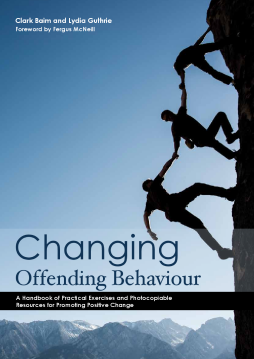
Additional Information
Book Details
Abstract
A one-stop resource of practical exercises for professionals to use in direct work with offenders aged 16+.
Changing Offending Behaviour is a guide to the essentials of rehabilitation theory which also equips the reader with ready-to-use photocopiable exercises and activities to help put the theory into practice in rehabilitation work with adult offenders. Drawing on a range of evidence-based methodologies, theories and treatment approaches, including Cognitive Behavioural Therapy (CBT), Attachment Theory, Relationally-based Therapies, Social Learning Theory, Motivational Interviewing and the Cycle of Change, this resource provides exercises to increase self-understanding, examine patterns of behaviour, and build empathy and other crucial skills. All the exercises are culturally aware and designed for maximum flexibility to meet different needs and learning styles.
Covering must-know theory and packed with practical exercises that work, this is an indispensable resource for probation workers and related professionals.
I thoroughly enjoyed reading Changing Offending Behaviour. Throughout there was a real focus on the individual developing insight and self-management. I would recommend Changing Offending Behaviour to any practitioner working directly with clients in the criminal justice system for both individual and group work; an excellent read.
Tania Tancred, C Psychol, CSci, AFBPsS, Chartered Psychologist, Chartered Scientist and Associate Fellow of the British Psychological Society
Changing Offending Behaviour sets out to be an accessible work-based resource for busy practitioners in a range of disciplines, and does just that. The book provides clear and comprehensible summaries of current thinking on Theory, Principles and Skills for relationship-based practice (Part One), and then provides a well-constructed and broadly based series of simple to understand Exercises and Session Descriptions (Part Two). It is full of well-founded professional advice, wisdom and encouragement.
Gerry Marshall, former Chief Executive, Thames Valley Probation
This book will be an invaluable tool for those working with offenders and will help promote a positive and compassionate approach to the work undertaken. It is very well structured with a wide range of clearly written and helpful exercises, many useful tips and strategies for the practitioner and sufficient theory to explain the underpinnings and rationale for the areas addressed and aims of the exercises.
Dawn Fisher, Ph.D. Consultant Clinical and Forensic Psychologist, St Andrews and University of Birmingham
Like all great books, this one will help you by encouraging you to ask intelligent and provocative questions - and if you use it wisely, it will support positive changes in your practice and therefore positive changes in others.
From the Foreword by Fergus McNeill, Professor of Criminology and Social Work, University of Glasgow
The book split into two main sections. The first section covers the theories and principles underpinning our practice and the essential skills and frameworks for practitioners. The second section of the book introduces the exercises to promote positive change... I like the language and tone of this book. It's all very positive and encouraging.... This book very much focuses on engagement. Each worksheet or exercise is explained thoroughly to give the practitioner confidence in the delivery... it is a really good resource.
Lydia Guthrie
Probation Officer blog
Clark Baim was a Co-Lead National Trainer for the National Probation Service in England and Wales for 12 years and continues to work internationally as an independent trainer. He is a registered psychotherapist and senior trainer with the British Psychodrama Association, and he is Co-Director of Change Point Ltd., which offers staff training in a wide variety of organizations. He is also Co-Director of the Birmingham Institute for Psychodrama and was the founding Director of Geese Theatre UK, a theatre company which focuses on offender rehabilitation. Clark has published extensively on offender treatment, groupwork methods, psychotherapy, attachment theory, applied theatre and supervision, and is the author of Mindful Co-working, published by Jessica Kingsley Publishers. Lydia Guthrie has a long track record of work in the criminal justice and voluntary sectors, working with adults with disabilities and socially excluded young people. After qualifying as a social worker, she worked for the Probation Service from 1998–2009 as a probation officer, group facilitator and senior probation officer. She is Co-Director with Clark Baim of Change Point Ltd., where she works as an independent trainer and consultant specialising in areas of sexual offending and domestic abuse. She also worked for 4 years as a Co-Lead National Trainer for the Sexual Offending Groupwork Programmes run by the National Probation Service.
Based on a rich, integrated theoretical base and the authors' considerable professional experience, Changing Offending Behaviour provides an innovative, sophisticated and above all practical resource for the next generation of strengths-based offender rehabilitation practice.
Shadd Maruna, Dean, School of Criminal Justice, Rutgers University
